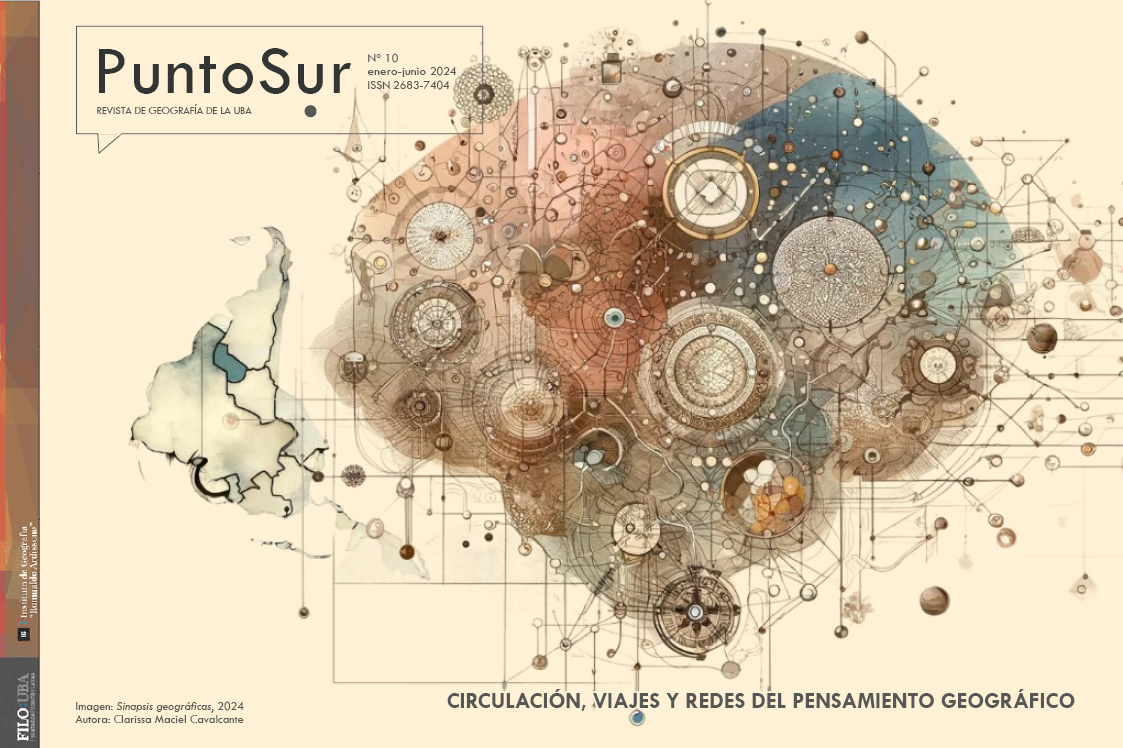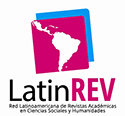Redescubrir otras tradiciones geográficas
Resumen
En los últimos años, una vibrante literatura interdisciplinaria e internacional ha venido redescubriendo áreas de la tradición geográfica cuyos exponentes no coincidían con el estereotipo clásico, racista y patriarcal del geógrafo, como hombre blanco académico occidental que directa o indirectamente contribuía al colonialismo, la guerra y el conservadurismo social. Investigaciones de fuentes primarias, actualmente en curso, han demostrado que las primeras tendencias progresistas, disidentes y poco ortodoxas en la historia de la disciplina fueron más penetrantes e influyentes de lo que se creía. En este artículo, defino a este movimiento como el redescubrimiento de “Otras Tradiciones Geográficas” (OTG) y propongo que esta noción puede permitir ampliar nuestra comprensión de la geografía como un campo plural y disputado. Si bien gran parte de esta literatura comprende estudios sobre las tempranas geografías anarquistas y críticas, sostengo que este concepto debe extenderse a la producción académica del Sur Global en idiomas diferentes al inglés; producción que también contribuye mucho al descubrimiento de diferentes tradiciones geográficas, tanto política como culturalmente. Para ello, abordo estudios recientes latinoamericanos, en español y portugués, sobre la historia y la filosofía de las geografías críticas. Además, el hecho de que estudiosxs “del Sur” estén releyendo y traduciendo figuras clásicas de geógrafxs “del Norte” constituye una inversión de la antigua mirada colonial Norte-Sur a la Sur-Norte. Esto sugiere que el estudio de las OTG también debería considerar diferentes tradiciones culturales y lingüísticas desafiando, así, el monolingüismo tanto en las revisiones de literatura como en la selección de fuentes.Descargas
Citas
Akerman, J. (Ed.) (2009). The imperial map, cartography and the mastery of empire. Chicago: University of Chicago Press.
Akerman, J. (Ed.) (2017). Decolonizing the map: Cartography from colony to nation. Chicago: University of Chicago Press.
Antunes, W. (2017). Um model de resenha por Camille Vallaux. GEOgraphia, 19(39), 95–102.
Arantes, L. (2016a). Carl Ritter: educador e geógrafo. GEOgraphia, 18(36), 207–212.
Arantes, L. (2016b). Alexander von Humboldt. GEOgraphia, 18(38), 164–176.
Baigent, E. (2004). The geography of biography, the biography of geography: Rewriting the Dictionary of National Biography. Journal of Historical Geography, 30, 531–551.
Bantman, C., & Altena, B. (Eds.) (2015). Reassessing the transnational turn: Scales of analysis in anarchist and syndicalist studies. New York and London: Routledge.
Barnes, T. J. (2009). “Not only … but also”: Quantitative and critical geography. The Professional Geographer, 61(3), 292–300.
Barnes, T. J. (2016). The odd couple: Richard Hartshorne and William Bunge. The Canadian Geographer/Le Géographe canadien, 60(4), 458–465.
Barnes, T. J. (2018). A marginal man and his central contributions: The creative spaces of William (‘Wild Bill’) Bunge and American geography. Environment and Planning A, 50(8),1697‐1715.
Barnes, T. J., Heynen, N., Merrifield, A., & Mountz, A. (2011). Classics in human geography revisited: William Bunge's (1971) Fitzgerald: Geography of a revolution. Progress in Human Geography, 35(3), 712–720.
Bentley, G. C., McCutcheon, P., Cromley, R. G., & Hanink, D. M. (2016). Fitzgerald: A return to the neighbourhood and its contemporary structural and geographical contexts. The Professional Geographer, 68(3), 414–426.
Bergmann, L., & Morrill, R. (2018). William Wheeler Bunge: Radical geographer (1928–2013). Annals of the American Association of Geographers, 108(1), 291–300.
Borzacchiello da Silva, J. (2016). French‐Brazilian geography: The influence of French geography in Brazil. Berlin: Springer.
Bressey, C. (2013). Empire, race and the politics of anti‐caste. London: Bloomsbury.
Bressey, C. (2017). Radical history then and now. History Workshop Journal, 83, 217–222.
Brun, C. (2015). Elisée Reclus, une chronologie familiale. Raforum Reclus http://raforum.info/reclus/spip.php?article455
Buttimer, A. (2012). Alexander von Humboldt and planet earth's green mantle. Cybergeo, http://journals.openedition.org/cybergeo/25478
Carter, E. (2018) Population control, public health, and development in mid twentieth century Latin America. Journal of Historical Geography, 62, 96–105.
Castillo, L. (2017). Cartography in the production (and silencing) of Colombian independence history, 1807–1827. In J. Akerman (Ed.), Decolonizing the map: Cartography from colony to nation (pp. 110–159). Chicago: University of Chicago Press.
Chappell, J. (2018). Beginning to end hunger. In Food and the environment in Belo Horizonte, Brazil, and beyond. Oakland: University of California Press.
Clerc, P., & Robic, M. C. (Eds.) (2015). Des géographes hors‐les‐murs? Itinéraires dans un monde en mouvement, 1900–1940. Paris: L'Harmattan.
Clout, H. (2016). The Vidalian Geographie universelle: Five authors on the fringes of the French university world –Yves Chataigneau (1891–1969), Pierre Denis (1883– 1951), Fernand Grenard (1866–1942), Fernand Maurette (1878–1937), and Paul Privat‐Deschanel (1867–1942). In H. Lorimer, & C. W. J. Withers (Eds.), Geographers: Biobibliographical studies (ed., Vol. 35) (pp. 63–93). London: Bloomsbury Academic.
Craggs, R., & Wintle, C. (Eds.) (2016). Cultures of decolonisation, transnational productions and practices, 1945–70. Manchester: Manchester University Press.
Craib, R. (2017). Cartography and decolonisation. In J. Akerman (Ed.), Decolonizing the map: Cartography from colony to nation (pp. 11–71). Chicago: University of Chicago Press.
Creagh, R., & Deschler, C. (Eds.) (2018). [E. Reclus] Lettres à Clarisse. Paris: Garnier.
Cresswell, T. (2013). Geographic thought: A critical Introduction. Chichester: Wiley‐Blackwell.
Culcasi, K. (2017). Multi‐scalar nations: Cartography and counter‐cartography of the Egyptian nation‐state. In J. Akerman (Ed.), Decolonizing the map: Cartography from colony to nation (pp. 252–283). Chicago: University of Chicago Press.
Davies, Andy (2017). Exile in the homeland? Anti‐colonialism, subaltern geographies and the politics of friendship in early twentieth century Pondicherry, India. Environment and Planning D, Society and space, 35(3), 457–474.
Davies, A. (2018). Milton Santos: The conceptual geographer and the philosophy of technics. Progress in Human Geography. Early view http://journals.sagepub.com/doi/full/10.1177/0309132517753809
Delgadillo, J. (2015). Por una geografía humanista: Ángel Bassols Batalla. Mexico: UNAM.
Desbiens, C. and Ruddick S. (2006) Speaking of Geography: Language, Power, and the Spaces of Anglo‐Saxon ‘hegemony’ Environment and Planning D, Society and Space 24, 1, 1–8.
Driver, F. (2012). Hidden histories made visible? Reflections on a geographical exhibition. Transactions of the Institute of British Geographers, 38(3), 420–435.
El Hakim de Paula, A. (2014). Piotr Kropotkin—Apresentação. GEOgraphia, 16(32), 171–173.
Esson, J., Noxolo, P., Baxter, R., Daley, P., & Byron, M. (2017). The 2017 RGS‐IBG chair's theme: Decolonising geographical knowledges, or reproducing coloniality? Area, 49(3), 384–388.
Featherstone, D. (2017). Anti‐colonialism and the contested spaces of communist internationalism. Socialist History, 52, 48–58.
Ferretti, F. (2014) Pierre Deffontaines et les missions universitaires françaises au Brésil: enjeux politiques et pédagogiques d'une société savante outremer (1934–1938). Cybergeo European Journal of Geography, http://cybergeo.revues.org/
Ferretti, F. (2015). A new map of the Franco‐Brazilian border dispute (1900). Imago Mundi, 67(2), 229–242.
Ferretti, F. (2016). Arcangelo Ghisleri and the “right to barbarity”: Geography and anti‐colonialism in Italy in the Age of Empire (1875‐1914). Antipode, 48(3), 563–583.
Ferretti, F. (2017). Political geographies, unfaithful translations and anti‐colonialism: Ireland in Élisée Reclus's geography and biography. Political Geography, 59, 11–23.
Ferretti, F. (2018a). Anarchy and geography. Reclus and Kropotkin in the UK. Abingdon: Routledge.
Ferretti, F. (2018b). Geographies of internationalism: Radical development and critical geopolitics from the Northeast of Brazil. Political Geography, 63, 10–19.
Ferretti, F., Barrera de la Torre, G., Ince, A., & Toro, F. (Eds.) (2017). Historical geographies of anarchism. Abingdon: Routledge.
Ferretti, F., & Jones, A. (2018). Anne Buttimer. 1938‐2017. In E. Baigent & A. Reyes Novaes. (Eds.) Geographers Biobibliographical Studies (Vol. 37), (pp. 13–40). London: Bloomsbury Academic.
Ferretti, F., & Viotto Pedrosa, B. (2018). Inventing critical development: A Brazilian geographer and his Northern networks Transactions of the Institute of British Geographers, 43(4), 703–717.
Fontana, C. (2014) Fome e questão ambiental: uma leitura a partir da obra de Josué de Castro (PhD Dissertation). Porto Alegre: UFRGS.
Glacken, C. (1980). Interview to Clarence Glacken realised by Allan Pred. International Dialogue Project, G15, https://www.youtube.com/watch?v=izZ2mbXsw94&feature=youtu.be
Griffin, P. (2018). Making usable pasts: Collaboration, labour and activism in the archive. Area, 40(4), 501–508.
Györi, R. (2015). Communist geography instead of nationalist geography: The new cadres and the case of Sándor Radó. Hungarian Cultural Studies, 8, 124–146.
Haesbaert, R., Nunes Pereira, S., & Ribeiro, G. (Eds.) (2012). Vidal, Vidais: textos de Geografia Humana, Regional e Política. Rio de Janeiro: Bertrand Brasil.
Harley, J. B. (2001) The *new nature of maps: essays in the history of cartography. Baltimore and London: Johns Hopkins University Press.
Heffernan, M. (2015). The interrogation of Sándor Radó: Geography, communism and espionage between World War Two and the Cold War. Journal of Historical Geography, 47, 74–88.
Heffernan, M., & Thorpe, B. J. (2018). ‘The map that would save Europe’: Clive Morrison‐Bell, the Tariff Walls Map, and the politics of cartographic display. Journal of Historical Geography, 60, 24–40.
Heynen, N. (2013). Marginalia of a revolution: Naming popular ethnography through William W. Bunge's Fitzgerald. Social and Cultural Geography, 14(7), 744–751.
Heynen, N., Kent, A., McKittrick, K., Gidwani, V., & Larner, W. (2017). Neil Smith's long revolutionary imperative. Antipode, 49(1), 5–18.
Hodder, J. (2016). Toward a geography of Black Internationalism: Bayard Rustin, nonviolence and the promise of Africa. Annals of the American Association of Geographers, 106(6), 1360–1377.
Iumatti, P. T., & Nicodemo, T. L. (2018). Arquivos pessoais e a escrita da história no Brasil: um balanço crítico. Revista Brasileira de História, 38(78), 1–24.
Jöns, H. (2017). Feminizing the university: The mobilities, careers, and contributions of early female academics in the University of Cambridge, 1926–1955. The Professional Geographer, 69(4), 670–682.
Jöns, H., Monk, J., & Keighren, I. M. (2017). Introduction: Toward more inclusive and comparative perspectives in the histories of geographical knowledge. The Professional Geographer, 69(4), 655–660.
Kearns, G. (2004). The political pivot of geography. The Geographical Journal, 170, 337–346.
Keighren, I. M. (2017a). Circulating seditious knowledge: The ‘daring absurdities, studied misrepresentations, and abominable falsehoods’ of William Macintosh. In H. Jöns, P. Meusburger, & M. Heffernan (Eds.), Mobilities of knowledge (pp. 67–84). Cham: Springer.
Keighren, I. M. (2017b). ‘A Royal Geographical Society for ladies’: The Lyceum Club and women's geographical frontiers in Edwardian London. The Professional Geographer, 69(4), 661–669.
Keighren, I. M. (2018). History and philosophy of geography II: The excluded, the evil, and the anarchic. Progress in Human Geography, 42(5), 770–778.
Keighren, I. M., Abrahamsson, C., & Della Dora, V. (2012). On canonical geographies. Dialogues in Human Geography, 2(3), 296–312.
Keighren, I. M., Withers, C. W. J., & Bell, B. (2015). Travels into print: Exploration, writing, and publishing with John Murray, 1773–1859. Chicago: Chicago University Press.
Kinna, R. (2016). Kropotkin: Reviewing the classical anarchist tradition. Edinburgh: Edinburgh University Press.
Lefebvre, H. (2017). Problemas teóricos da autogestão. GEOgraphia, 19(41), 135–141.
Lefort, I., & Pelletier, P. (2015). Élisée Reclus ou la condition géographique: habiter la terre. Annales de géographie, 704(4), 338–350.
Livingstone, D. N. (2012). Changing climate, human evolution, and the revival of environmental determinism. Bulletin of the History of Medicine, 86(4), 564–595.
Machado, C. R. S. (2008). Momentos da obra de Henri Lefebvre: uma apresentação. Ambiente e Alimentação, 13, 83–95.
MacLaughlin, J. (2016). Kropotkin and the anarchist intellectual tradition. London: Pluto Press.
Maddrell, A. (2009). Complex locations: Women's geographical work in the UK 1850–1970. Oxford: Wiley‐Blackwell.
Marso, J. L. (Ed.) (2016). Fifty‐one feminist thinkers. Abingdon: Routledge.
McGregor, J. (2017). Locating exile: Decolonization, anti‐imperial spaces and Zimbabwean students in Britain, 1965‐1980′. Journal of Historical Geography, 57, 62–75.
Melgaço, L. (2017). Thinking outside the bubble of the Global North: Introducing Milton Santos and ‘the active role of geography’. Antipode, 49(4), 946–951.
Melgaço, L., & Prouse, C. (Eds.) (2017). Milton Santos: Pioneer in geography. London: Springer.
Mendoza Vargas, H. (2016). La mirada alemana sobre México en tres viajeros: Alexander von Humboldt (1769‐1859), Friedrich Ratzel (1844‐1904) y Adolf Reichwein (1898‐1944). Scripta Nova, 20, 544. http://revistes.ub.edu/index.php/ScriptaNova/article/view/544/19717
Mendoza Vargas, H. (2017). Ángel Bassols Batalla y la renovación de la geografía mexicana. Terra Brasilis, 9, http://journals.openedition.org/terrabrasilis/2307
Mendoza Vargas, H. (2018). Graciela Uribe Ortega y la transición de la geografía Mexicana. Terra Brasilis, 10, https://journals.openedition.org/terrabrasilis/2577
Mitchell, D. (2014). Neil Smith, 1954–2012: Marxist geographer. Annals of the Association of American Geographers, 104(1), 215–222.
Mitchell, D. (2015). Neil Smith (1954–2012). In H. Lorimer, & C. W. J. Withers (Eds.), Geographers biobibliographical studies (ed., Vol. 34) (pp. 203–244). London: Bloomsbury Academic.
Netto, R. J. (2018). Piotr Kropotkin: breve introdução ao autor. GEOgraphia, 20(42), 115.
Norcup, J. (2015). Awkward geographies? An historical and cultural geography of the journal Contemporary Issues in Geography and Education (CIGE) (1983–1991). PhD thesis, University of Glasgow.
Noxolo, P. (2017). Introduction: Decolonising geographical knowledge in a colonised and re‐colonising postcolonial world. Area, 49(3), 317–319.
Pelletier, P. (2013). Géographie et anarchie: Reclus, Kropotkine, Metchnikoff. Paris: Editions du Monde Libertaire.
Radcliffe, S. (2017). Decolonising geographical knowledges. Transactions of the Institute of British Geographers, 42(3), 329–333.
Ramírez Palacios, D., & Skoda, A. (2016). Élisée Reclus e a Geografia dos Novos Mundos. Terra Brasilis, 7, http://journals.openedition.org/terrabrasilis/1761
Ramírez Velázquez, B. R. (2012). Geografía crítica: territorialidad, espacio y poder en América Latina. Investigaciones Geograficas, 77, 151–155.
Ramaswami, S. (2017). Art on the line: Cartography and creativity in a divided world. In J. Akerman (Ed.), Decolonizing the map: Cartography from colony to nation (pp. 284–338). Chicago: University of Chicago Press.
Reclus, E. (2010). Crônica geográfica. GEOgraphia, 12(24), 166–168.
Ribeiro, G. (2017). Fernand Braudel, geo‐história e longa duração. Criticas e virtudes de um projeto historiográfico. São Paulo: Annablume.
Rothenberg, T., Morin, K. M., & Domosh, M. (2016). Introduction: Feminist historical geographies. Historical Geographies, 44,27–29.
Santos, M. (2017). Toward another globalization: From the single thought to universal conscience. Berlin: Springer.
Santos Silva, M. F. (2016). Josué de Castro: um Autor do Legado Esquecido? (PhD Dissertation). Campinas: Unicamp.
Sidaway, J. D., White, R. J., Barrera de la Torre, G., Ferretti, G., Crane, N. G., Loong, S., Springer, S. (2017). Book review fora: The Anarchist Roots of Geography: Toward Spatial Emancipation. AAG Review of Books, 5(4), 281–296.
Siegrist, P. (2017). Historicising anarchist geographies: Six issues for debate from a historian's point of view. In F. Ferretti, G. Barrera, A. Ince, & F. Toro (Eds.), Historical geographies of anarchism (pp. 129–150). Abingdon: Routledge.
Silvia, J. M., Ornat, M. J., & Chimin, A. B. (2017). Não me chame de senhora, eu sou feminista! Posicionalidade e reflexibilidade na produção geográfica de Doreen Massey. GEOgraphia, 19(40), 11–20.
Smith, N., & Desbiens, C. (2000). An interview with Graciela Uribe Ortega. Environment and Planning D: Society and Space, 18(5), 545–556.
Souza, M. L. (2017). Por uma geografia libertaria. Rio de Janeiro: Consequência.
Souza, M. L., White, R. J., & Springer, S. (Eds.) (2016). Theories of resistance: Anarchism, geography and the spirit of revolt. Lanham: Rowman & Littlefield.
Sparke, M. (2007). Everywhere but always somewhere: Critical geographies of the Global South. The Global South, 1‐2, 117–126.
Springer, S. (2016). The anarchist roots of geography: Toward spatial emancipation. Minneapolis: University of Minnesota Press.
Springer, S., Souza, M. L., & White, R. J. (Eds.) (2016). The radicalization of pedagogy: Anarchism, geography, and the spirit of revolt. London: Rowan and Littlefield.
Stoddart, D. R. (1975). Kropotkin, Reclus, and ‘relevant’ geography. Area, 7(3), 188–190.
Urquijo Torres, P., & Bocco Verdinelli, G. (2016). Pensamiento geográfico en América Latina: retrospectiva y balances generales. Investigaciones Geográficas, 90, 155–175.
Vasconcelos, P. A. (2018). Milton Almeida dos Santos (1926‐2001). In E. Baigent, & A. Reyes Novaes (Eds.), Geographers biobibliographical studies ( ed., Vol. 37) (pp. 41–68). London: Bloomsbury.
Venuti, L. (Ed.) (2000). The translation studies reader. New York and London: Routledge.
Viotto Pedrosa, B. (2015). Sauer, Boas, Kroeber e a cultura superorgânica: notas sobre a relação entre geografia e antropologia. Confins, 23 http://journals.openedition.org/confins/9958
White, R. J. (2015). Following in the footsteps of Elisée Reclus: Disturbing places of inter‐species violence that are hidden in plain sight. In A. J. Nocella, II, R. J. White, & E. Cudworth (Eds.), Anarchism and animal liberation. Essays on complementary elements of total liberation (pp. 212–230). Jefferson: Mc Farland & Company.
White, R. J., Souza, M. L., & Springer, S. (Eds.) (2016). The practice of freedom: Anarchism, geography, and the spirit of revolt. London: Rowan and Littlefield.
Ziegler, J. (2013). Betting on hunger. Why the world still goes hungry. New York/London: The New Press.
Derechos de autor 2024 Federico Ferretti; Gonzalo Ezequiel Lus Bietti, Mónica Farías

Esta obra está bajo licencia internacional Creative Commons Reconocimiento 4.0.

 Aviso importante
Aviso importante




















